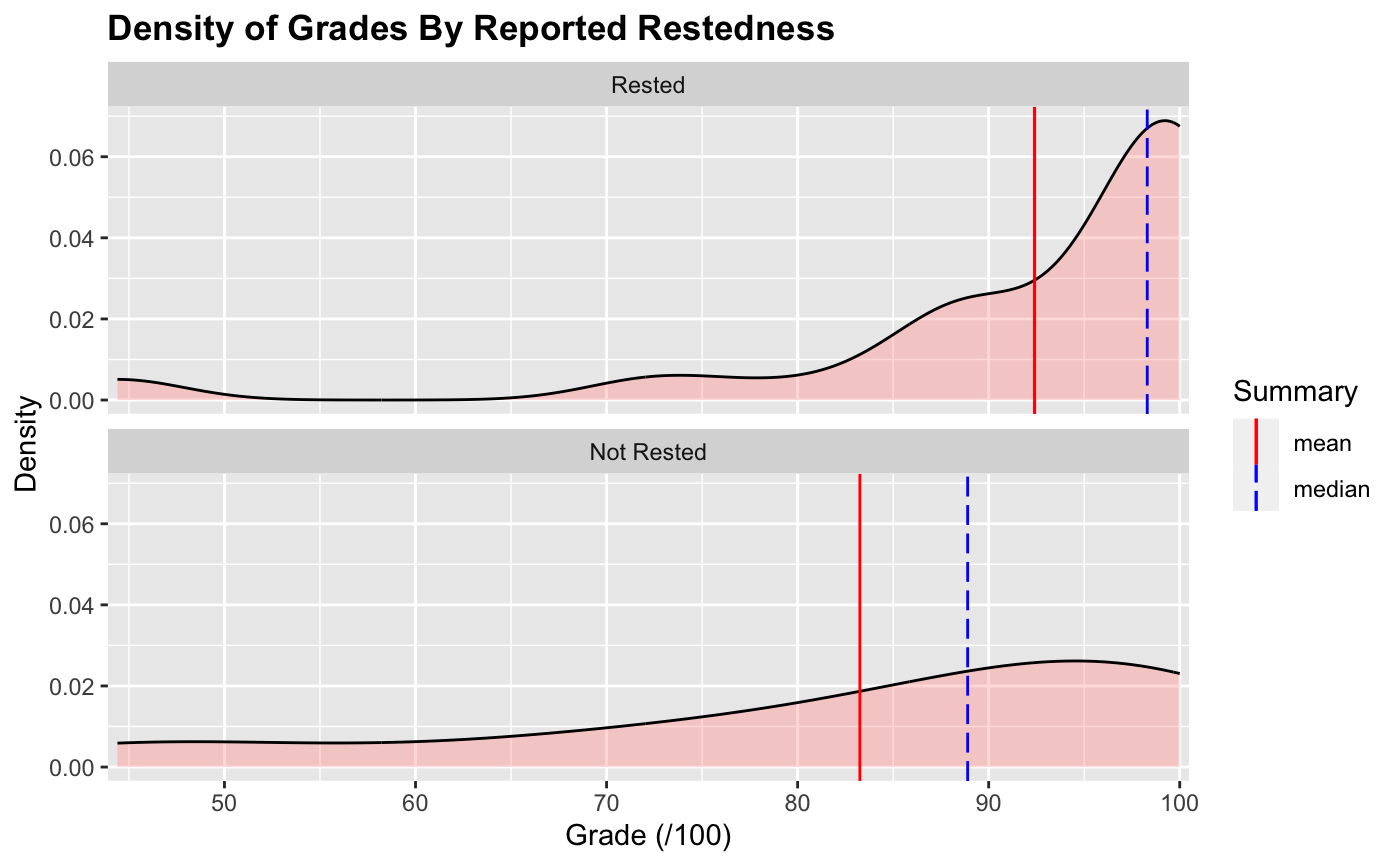Microstudies: Part 1
Should you rest before that test?
We all know the common advice given to students before a test: "Make sure you rest well before the test!" However, should we try to be well-rested before a test? Many of the people I know, myself included, report being in a state of caffeine addled insomnia for the duration of their exam periods—and, you know, not to brag or anything, but we all seem to have done alright. So, does the claim that you should rest before a test hold any water? To begin to pick this claim apart, I gave CS1 students a single-question questionnaire before an invigilated test asking whether they were feeling well-rested.
Specifically, the hypotheses being tested are:
H: The null hypothesis is that grades attained by students do not depend on whether they report feeling well-rested or not well-rested.
H: The alternative hypothesis is that students who report feeling well-rested will attain higher grades than students who report not feeling well-rested.
Method
The course in question is a CS1 course designed for students who have no prior programming experience that teaches the basics of imperative programming using the Python programming language in 2024. The course has four computer-based tests spread throughout the semester run asynchronously during students' normal lab times. The study was conducted during the summer semester (Jan-Feb), which is a short and intensive semester run over six weeks (compared to the usual 15-week semester at the institution).
In total, there were 85 students enrolled in the course with the test organized over two back-to-back streams. Fifty-five students were enrolled in stream 1, and thirty were enrolled in stream 2. Three students did not sit the test and have been excluded from further analysis.
Students fill in a paper attendance sheet at the start of each test that they must hand in before leaving the room. Beneath the name, ID, and seat number fields, I asked the teaching team to add the following yes/no question:

Results
The average grade on the test was 88%. There was a slight difference between the grades for each stream (87.17% for stream 1 and 88.16% for stream 2); however, these differences are not significant1.
Of the 82 students who sat the test, 65 responded to the questionnaire. In response to the question of whether they felt well-rested, 45 students responded "Yes" and 20 responded "No".
The breakdown of students reported restendess by stream is as follows:
| Stream 1 | Stream 2 | |
|---|---|---|
| Well-rested | 30 | 15 |
| Not Well-rested | 15 | 5 |
The grade distributions for each group are below:

The mean grades for the rested/not-rested groups are 92% and 83% respectively. The median grades for the rested/not-rested groups are 98% and 88% respectively. The difference between these two groups is significant (U=598, p=0.015)2.
Discussion
From the results, it seems there is enough evidence to reject the null hypothesis, , and accept the alternative: , students who report being well-rested attain higher grades than students who report not being well-rested.
Limitations and Threats
One obvious limitation of this study is that I only asked a single cohort of students a single question in a self-selected questionnaire.
A possible threat to the validity of this study is that the study was run during summer school and not during "normal" semester times. At this institution, "summer school" (a semester run over six weeks during January and February) is an intensive semester usually only enrolled in by few high-achieving students who want to quickstart their degrees. It is likely that this cohort is not representative of normal student cohorts.
Conclusions
So, should students rest before tests? Maybe. As the old saying goes, correlation does not equal causation. There is no evidence in this analysis that being well-rested causes higher grades—and it's easy to come up with several plausible hypotheses for why this difference occurs. For example, students who feel well rested during the afternoon, or on a test day, may have better study or self-care habits. Perhaps students who don't rest before tests are more likely to not study regularly and spend the night before tests cramming—a possibly inefficient study strategy. Or, maybe it's something completely different! As always, more studies are needed.
Footnotes
-
The grades for both streams are not normally distributed: Stream 1 (W=0.71, p<1e-8), Stream 2 (W=0.66, p<1e-6). A 2-tailed Mann-Whitney test was performed to compare the groups: (U=583, p=0.067). ↩
-
The grades for the rested/not-rested groups are not normally distributed: Rested (W=0.63, p<1e-8), Not-rested (W=0.84, p=0.004). A 1-tailed Mann-Whitney test was performed: (U=598, p=0.015) ↩